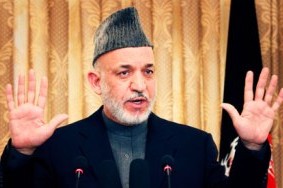By Hanan Habibzai
![]() In January 2002, Tom Ford, aka Mr. Fashion, at his menswear show for Gucci in Milan, comes up with a surprising idea to recognize the newly appointed Afghan leader, Hamid Karzai, “the chicest man in the world”.
In January 2002, Tom Ford, aka Mr. Fashion, at his menswear show for Gucci in Milan, comes up with a surprising idea to recognize the newly appointed Afghan leader, Hamid Karzai, “the chicest man in the world”.
He was in the news not for his political knowledge and foreign policies but for his dressing style. After eight years, Mr. Karzai no longer remains a ‘’chic man ‘’.
His government appeared deeply involved in corruption and injustice. Most Afghans no longer hope for a better life while corrupt officials hold power.
‘’It is a shame that foreign donors are wasting their money by giving it in the hands of corrupt officials and we, therefore, do not see any positive result’’ a Kabul shopkeeper Sayed Karim regrettably told me during an interview.
‘’International community and Afghan people should bring a change within official circles to ensure that people have access to justice, food, education and remain united.’’ Karim added.

- His government appeared deeply involved in corruption and injustice. Most Afghans no longer hope for a better life while corrupt officials hold power.
These are the common thoughts. Afghan media is seriously considering the frail official performance. On the other hand, the Afghan government avails every opportunity to curb the Afghan writers and journalists from finding the best obtainable version of truth.
The recent detention of Radio Kapisa’s director, for being outspoken on government corruption, raised concerns among Afghan journalists.
The 34-year-old Hojatullah Mujadidi has been arrested by the Afghan National Directorate of Security (ANDS) in Kapisa province.
A press statement of Reporters Without Borders confirms; ‘’a high ranking ANDS official Khajeh Zafar in Kapisa province, ordered the arrest on 18 September in connection with terrorist activities but the ANDS has produced no evidence to support the claim.’’ Support for Mujadidi is high. His arrest damages the credibility of Karzai and his government, particularly in Kapisa where the number of his critics is widespread and his opponents are apparently active in political conduct.
There is a growing clamor from members of the press and cultural figures for a crackdown on what is seen as loutish behavior of officials.
‘’ He was not permitted by Kapisa’s governor to investigate the increasing corruption within local official branches. An innocent journalist can not behave as a violent person. We are quite hopeless.’’ Mohammed Adris a friend of Mr. Mujadidi shared his via phone.
Afghan Justice Ministry suggested the safe release of Mr. Mujadidi because the AND failed to provide evidence in support of the organization’s claim against Mujadidi.
The dispute is local in its very essence but the government is caught up in it. This dispute resonates among ordinary Afghans, who remember previous attempts by the government to silence the voice of the country’s writers. Afghans increasingly believe that the marginalization of writers results in the marginalization of the society at large.
Afghan intellects and journalists are still mourning the cruel murder of BBC journalist Abdul Samad Rohani and CTV’s Ahmad Javeed Yazmy-Jojo.
Rohani was kidnapped in June 2008, a few meters away from the provincial office, the seat of the Afghan government’s power. He has not been seen alive since. While Javeed was assassinated in Kandahar earlier last year, having spent nearly a year in an American military jail in Afghanistan, after being accused of having links to militants. He died just a few months after his release.
A great deal of Rohani’s work focused on uncovering war crimes, and corruption and documenting the increase in drug trafficking. For this, he was widely detested by the local government.
In June 2010, the Governor of Helmand province Gulab Mangal confirmed the murder was staged by local security officials. The Governor also admitted that he was too weak to arrest the killers.
The Government’s refusal of hearing the demands for justice deteriorated its position in the Rohani and Javeed murders cases. In addition, by targeting Hojatullah Mujadidi, the government has left itself vulnerable as people inevitably start to question the war being waged against journalists, writers, and other activists who dare to hold politicians to account.

Hanan Habibzai, an investigative journalist with more than ten years of experience in global journalism has covered the US invasion of Afghanistan, the fall of the Taliban regime, and post-Taliban developments, including the rise of militancy in the country.
MA in global journalism from Coventry University, Hanan writes on the conflict in Afghanistan and the regional politics, his work has been published by the BBC Afghan Stream, Pajhwok Afghan News, Reuter’s news agency, the Washington Post, Veterans Today, several local and the global media agencies, Including contribution in a journalism book Afghanistan War and the Media: Deadline and Frontline (2010), edited by R, Keeble & J, Mair, Hanan’s academic work is published around the world.
ATTENTION READERS
We See The World From All Sides and Want YOU To Be Fully InformedIn fact, intentional disinformation is a disgraceful scourge in media today. So to assuage any possible errant incorrect information posted herein, we strongly encourage you to seek corroboration from other non-VT sources before forming an educated opinion.
About VT - Policies & Disclosures - Comment Policy




